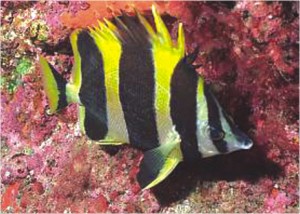| |
SCIENCE FORUM
The weird and wonderful world of 'Improbable Research'
Rashida Ahmad peruses the winners of this year's Ig Nobel Prizes
Have you ever lain awake at night contemplating what the side effects might be if you took up sword swallowing as a hobby? Have you ever pondered on what types and how many creatures -- apart from your snoring partner -- occupy the bed you are lying in? (If you didn't before, perhaps you will now!) Have you ever had to prepare an index or bibliography and been flummoxed by the definite article, “the,” in the title?
Well now you can stop contemplating, pondering and being flummoxed; for these are just some of the weird and wonderful research topics of the eminent -- and perhaps some less-than-eminent-- winners of the Ig Nobel Prizes.
The Ig Nobel Prizes are organised by the magazine <>Annals of Improbable Research<>. The magazine publishes genuine, improbable research culled from more than 20,000 scientific, medical, technical and academic journals, as well as original research.
From among the world's most improbable research, the Ig Nobel Prizes honor the scientific quests that first make people, and then make them .
"The prizes are intended to celebrate the unusual, honor the imaginative -- and spur people's interest in science, medicine, and technology," according to the magazine's editors.
The Ig Nobel award ceremony is held in the same month that the slightly more illustrious Nobel Prizes are awarded. Co-sponsored by the Harvard-Radcliffe Society of Physics Students and the Harvard-Radcliffe Science Society, the ceremony is held at Harvard University, where the awards are handed out by "genuinely bemused genuine Nobel Laureates."
"Our goal is to make people laugh, then make them think. We also hope to spur people's curiosity, and to raise the question: How do you decide what's important and what's not, and what's real and what's not -- in science and everywhere else?" say the Ig Nobel Prize organisers.
Among the winners this year at the 17th Annual Ig Nobel Prize Ceremony were those whose research was aforementioned, and quite a few more.
For medicine: Brian Witcombe (UK) and Dan Meyer (US), for their penetrating medical report "Sword Swallowing and Its Side Effects."
For biology: Prof Dr Johanna E M H van Bronswijk of Eindhoven University of Technology (Netherlands), for doing a census of all the mites, insects, spiders, pseudoscorpions, crustaceans, bacteria, algae, ferns and fungi with whom we share our beds each night; "Huis, Bed en Beestjes [House, Bed and Bugs]."
For chemistry: Mayu Yamamoto of the International Medical Center of Japan, for developing a way to extract vanillin -- vanilla fragrance and flavouring -- from cow dung; "Novel Production Method for Plant Polyphenol from Livestock Excrement Using Subcritical Water Reaction."
For linguistics: Juan Manuel Toro, Josep B Trobalon and Núria Sebastián-Gallés, of Universitat de Barcelona (Spain), for showing that rats sometimes cannot tell the difference between a person speaking Japanese backwards and a person speaking Dutch backwards; "Effects of Backward Speech and Speaker Variability in Language Discrimination by Rats."
For literature: Glenda Browne (Australia), for her study of the word "the" -- and of the many ways it causes problems for anyone who tries to put things into alphabetical order; "The Definite Article: Acknowledging 'The' in Index Entries."
For peace: The Air Force Wright Laboratory, Dayton, Ohio (US), for instigating research & development on a chemical weapon -- the so-called “gay bomb” -- that will make enemy soldiers become sexually irresistible to each other; "Harassing, Annoying, and 'Bad Guy' Identifying Chemicals."
As for previous winners, the world is surely a better place and humanity is now safer in the knowledge of: why woodpeckers don't get headaches ("Woodpeckers and Head Injury"); how sound travels through melted cheddar cheese ("Ultrasonic Sound in Cheddar Cheese as Affected by Temperature"); why fingernails scraping on a blackboard sound irritating ("Psychoacoustics of a Chilling Sound"); and lastly, but not least crucially, the best way to get rid of hiccups ("Termination of Intractable Hiccups with Digital Rectal Massage")!
So rest assured, all you oddballs and eccentrics; next time you ponder the imponderable, or question the bizarre, someone, somewhere, is probably striving to answer your weird and wonderful questions on the nature of life, the universe and whatnot.
Rashid Ahmada is Contributing Editor, Forum.
Penguins go on fishing trips with their buddies

Little penguins, the smallest penguin species, go on long fishing trips to feed their chicks. Like other penguins they fish in groups of 5 to 10, to ward against predators. To find out if the birds seek out good team mates rather than form groups at random, researchers at the Philip Island Nature Park, Australia, studied little penguins over consecutive breeding seasons. They found that they did tend to team up with the same fishing partners, perhaps because it helps to share knowledge of particular feeding sites, for instance. However, only middle-aged penguins did so, and then only when food was abundant and a large number of chicks had fledged that year. In years when food was scarce the birds tended to fish alone to avoid sharing scarce resources. Older and young penguins, both of which are likely to be less good fishers, were never picked to be part of a team.
Artificial humour

Despite radical advances in artificial intelligence, robots remain notably devoid of a funny bone. Previously AI researchers have tended not to try mimicking humour, largely because the human sense of humour is so subjective, making it difficult to program. Now researchers at the University of Cincinnati in Ohio have built a computer program or "bot" that is able to get a specific type of joke -- a simple pun. The researchers first gave the bot a database of words, and then supplied examples of how words can be related to one another to create different meanings. When it finds a word in a passage that doesn't seem to fit, it searches a digital guide for similar-sounding words. If any of those words fits better with the rest of the sentence, it flags the passage as a joke. The result is a bot that "gets" jokes that turn on a simple pun.
Particle physics in your own home

Public involvement in the Large Hadron Collider, a particle accelerator being built in Switzerland, has received a boost with the relaunch of the LHC@home project. LHC@home has operated sporadically since 2004 as a way for users around the world to donate spare computing time to help scientists carry out work related to the LHC. It is modelled on the popular SETI@home software, which works as a screensaver and harnesses the computer ''downtime'' of millions of volunteers to help search through radio observations for potential alien transmissions. The LHC, set to switch on in May 2008, will probe the behaviour of matter at very high energies. Physicists hope it will help answer fundamental questions, such as how particles are endowed with mass. It may also shed light on astronomical puzzles, such as the origin of dark matter.
Mirrors are the best at deflecting asteroids

Focusing sunlight onto an asteroid with space-based mirrors is the best way to deflect Earth-bound space rocks, a new study finds. Asteroids larger than 5 kilometres across, such as the one that killed off the dinosaurs, hit Earth about once every 6 million years. But smaller space rocks spanning about 140 metres strike more often, about once every 5,000 years, and can cause significant damage. Now, researchers at the University of Glasgow in Scotland have compared nine methods to deflect such objects, including blasting them with nuclear explosions in space and using "gravity tractors." The team assessed the methods on three criteria: the change to the asteroid's orbit, the amount of warning time needed and the mass of the spacecraft needed for the mission. The method that came out on top was a swarm of mirror-carrying spacecraft.
Fish insomnia sheds light on sleep

Every animal sleeps, but evolution has produced different sleep systems in different animals -- e.g. dolphins take a separate nap in each hemisphere of their brains so they can keep swimming! And, zebrafish won't be caught napping after a sleepless night, a new study shows. Researchers at Stanford University in California found that if you keep zebrafish awake all night and then leave the lights off, they will snooze. But if you switch the lights on, they won't nap the next day, as mammals would. Apparently light and the hormone it triggers (melatonin) suppress sleep in the fish so strongly, they overrule any "sleep debt." The role of melatonin at some point became less effective in mammals, and they had to develop a different way to promote wakefulness, say the team.
Playing games with airport security

Playing games with airport security guards sounds like a bad idea, but researchers at the University of Southern California in Los Angeles is trying to thwart criminals by doing just that. Guards are usually told to patrol in a random fashion but, being human, they tend to form habits that patient criminals can exploit. To help make their rounds less predictable, the team created software based on game theory that simulates various random paths that a guard could take around Los Angeles International airport (LAX), and also how criminals might react. Potential rewards, such as catching more criminals, and costs, such as a terrorist explosion, are evaluated for each path. The software, being tested at LAX, then suggests the best route.
|






